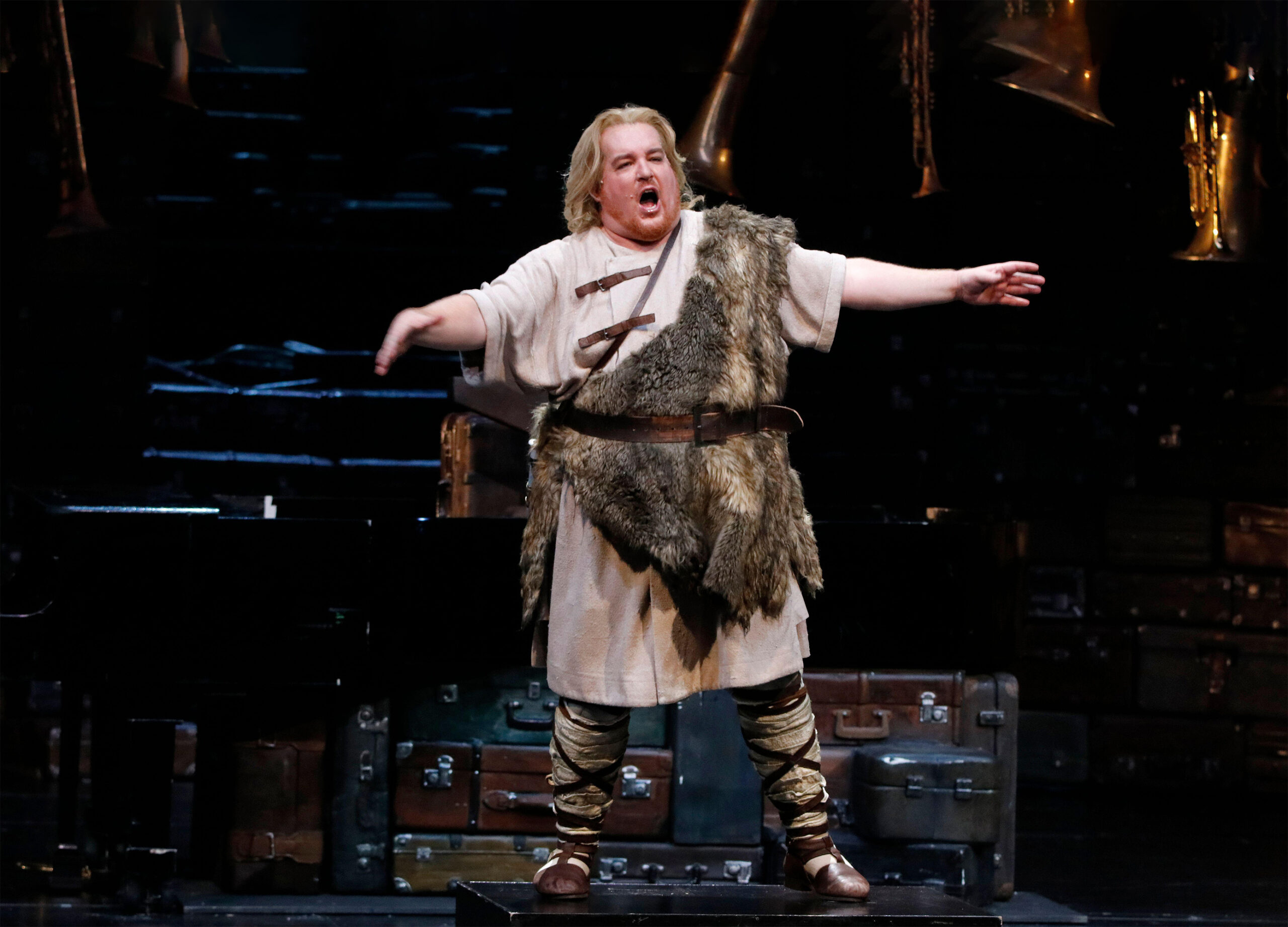The Loudest Voice in the Room
Tenor Clay Hilley is in rare company playing German opera heroes

Clay Hilley is one of fewer than 10 professional heldentenors—a subgroup of tenors who embody the heroic protagonists in operas by German composers—in the world. 360b/Alamy Stock Photo
The Loudest Voice in the Room
Tenor Clay Hilley is in rare company playing German opera heroes
Richard Wagner’s epic, four-part opera Der Ring des Nibelungen follows the struggle of gods, mortals, and mythical creatures over a ring that gives its holder dominion over the world. The superhero of the Ring cycle, as the renowned opera series is known colloquially, is Siegfried, a larger-than-life mortal who exists to recover the object from a giant, forging a sword no other human has the strength to forge before killing a dragon and eventually his own grandfather, the god Wotan. An actor singing Siegfried must possess a tenor voice that not only embodies the innate power entrusted to Wagner’s hero, but one resilient enough to endure a show run time that exceeds five hours. Only a handful of heldentenors, which translates to “hero tenor,” on Earth has the vocal range, stamina, and experience to play the part at the world’s leading opera houses. So, when veteran tenor Stephen Gould pulled out of Götterdämmerung, the fourth opera in Wagner’s Ring cycle, the day before its opening show at Germany’s 2022 Bayreuth Festival, opera management scrambled.
Clay Hilley (’11) and his wife, soprano Sara Duchovnay, were on vacation with friends in Puglia, Italy, when he noticed a call coming in on his cell phone from Bayreuth. “We were sitting there with Aperol spritzes in hand, eating some pasta,” Hilley recalls. “I said, ‘Sara, I think vacation might be coming to an abrupt end.’”
On the phone, Hilley, a tenor and graduate of BU’s Opera Institute, was only told he was needed as a backup for Gould in case he couldn’t go on as Siegfried the following day. The couple rushed back to their Airbnb, packed quickly, and called a cab to the airport for the two-hour flight to Munich. A driver met them there with the Götterdämmerung score for Hilley to study on the two-hour drive north to Bayreuth, near the composer’s birthplace.
Arriving at his hotel at 11 pm, Hilley tried to get some sleep before reporting to the theater at 10 the next morning to prepare for the 4 pm curtain time. That’s when he learned that Gould was apparently downed by a cold and that he would sing Siegfried on the famed Bayreuth Festival Theatre stage—the same stage where Wagner debuted the beloved opera nearly 150 years earlier. Costuming, makeup, final notes on the script, staging, and music took up every minute of the next six hours. Hilley took it all in stride and with good humor. After all, this was the break the 41-year-old had sought for more than half his life. He was about to become a hero tenor.
The Making of a Heldentenor
Within the tenor voice type exist six, sometimes seven, subgroups. Heldentenors are defined by their ability to embody the heroic protagonist in operas by German composers like Wagner, Strauss, and Beethoven and the extraordinarily high notes they can hit. That said, the hero has to hit those high notes. Where many heldentenors range up from the lower baritone parts, Hilley comes from the high side—which can give him an upper hand when performing Wagner.
“My low C is pretty weak,” Hilley admits. “But I get the top C, which really pays off in Götterdämmerung, where you have this big, a cappella high C that you’ve got to pump out there at the very end of a very long week.”

Hilley’s performances as Siegfried in Götterdämmerung at the Deutsche Oper Berlin put him on the radar of Katharina Wagner, great-granddaughter of the opera’s famed composer, Richard Wagner. Photo by Bernd Uhlig
Hilley is one of fewer than 10 professional heldentenors in the world singing classic German hero parts. He owes some of this to supply and demand: fewer opera houses are performing Wagner than works by the great Italian composers, like Puccini. Hilley, who stands 5 feet, 10 inches, can also thank biology for his position in the opera world: a fleshier throat and larger head allow him to “resonate all that big sound that you need to cut through a giant orchestra of over 100…to the people who paid for the tickets.”
Since making Berlin his home base in 2021, Hilley has parlayed his powerful, resilient voice and knowledge of Wagner into a packed performance schedule. In the fall of 2021 and spring of 2022, he played Siegfried in marathon performances of Götterdämmerung six times with the Deutsche Oper Berlin. He says this is where he first appeared on the radar of Katharina Wagner, the famed composer’s great-granddaughter, who remembered his name when Gould pulled out of the 2022 Bayreuth Festival.
Watch Clay Hilley perform a piece from Richard Strauss’ Die Frau ohne Schatten with the Berlin Philharmoniker Orchestra. Video courtesy of Hilley
Hilley followed the Berlin shows with three performances singing Tristan in Wagner’s Tristan and Isolde in November 2022, four performances as Der Kaiser in Strauss’ three-hour The Woman Without a Shadow in Baden-Baden in April 2023, and a five-performance run as the drum major in Alban Berg’s Wozzeck at London’s Royal Opera House in May and June 2023. According to the great American heldentenor Jon Fredric West, who has taught or coached Hilley since 2015, heldentenors must work for years to master the German “diction, style, and drama” and wait until their voices have matured enough to sing the repertoire. This means a heldentenor may not sing his first Siegfried or Tristan until he is in his late 30s, West says.
I get the top C, which really pays off in Götterdämmerung, where you have this big, a cappella high C that you’ve got to pump out there at the very end of a very long week.
“Clay stands at the top of the [heldentenor] breed because his tone is so beautiful in-house—not too dark and not too light,” West says.
Few in Statham, Ga., would have predicted Hilley’s voice would take him around the world. Like many others in town, Hilley grew up singing in his family’s Baptist church. He showed an early proclivity for the piano and trumpet—both of which he would keep up through high school. The first time Hilley’s mom and dad heard him sing by himself on a stage, he was a 10th grader making his dramatic debut in a school production of Gilbert and Sullivan’s comedic opera H.M.S. Pinafore. “I never sang around the house,” Hilley recalls, “so when I opened my mouth…they were like, ‘Is that our son? Is he lip-syncing?’”
Pinafore, it turns out, provided Hilley an operatic taste of something he loved. He devoured every opera he could after that, volunteering as an usher with his mom at Athens’ Classic Center so he could see operas and attending group classes with a vocal teacher in town. Hilley figured he would eventually teach rather than perform, until he was well into his music education studies at the University of Georgia. He joined the chorus of the local Athena Grand Opera Company, composed of a combination of university and community performers, and was enamored with the professional singers the company would pay to fill the lead roles.
“My focus became figuring out how to become one of those people up there singing for a living,” says Hilley, who added voice and piano as majors and packed in as many credit and rehearsal hours as he could. He earned a master’s in vocal performance from Georgia State University before moving to New York City to study at the Manhattan School of Music and BU’s Opera Institute. The only “book learning” Hilley did at BU were his Italian classes. The rest of his certificate program was “almost exclusively performing, which was wonderful.”
Siegfried in a Pinch
Backstage at the Bayreuth Festival Theatre in 2022, costume tailors and makeup artists buzzed around Hilley as he prepared to stand in as Siegfried on opening night of Götterdämmerung. Director Valentin Schwarz walked him through the show’s staging, which struck a notably contemporary feel. When conductor Cornelius Meister came by to meet with Hilley, the two barely had an hour to rehearse the score before festival director Katharina Wagner sent a messenger to the makeup room to have Hilley report for a quick walk-through of several scenes. Before the curtain opened, Hilley made sure his dressing room was stocked with the essentials he’d need to get through the vocal marathon ahead: granola bars and sandwiches for calories and protein, fresh pineapple or apple cider vinegar to protect against dreaded inflamed vocal cords, and sparkling apple juice with a hint of sweetness—apfelschorle, a German staple—to stay hydrated. If he strains his vocal cords during a performance, Hilley will take a few deep breaths of hot steam from a nebulizer he always keeps nearby. On that opening day, Hilley felt fine, if a little fatigued following the previous day’s travel, as he took the stage at Bayreuth.
Reviews of Schwarz’s modern twist on Götterdämmerung were mixed; the production team even received a smattering of boos and jeers after the show ended. But Hilley’s performance received widespread praise, with New York Times opera critic Zachary Woolfe writing that the heldentenor “would have been impressive even under less dramatic circumstances.”
Hilley is not slowing down. By the end of 2024, he will have taught or performed in Italy, Scotland, Canada, Hong Kong, Spain, and all over Germany. The only downside to his newfound opera stardom is a lack of vacation time. Even if he had the free time, his holiday is liable to be interrupted.
“These are great problems to have,” he says with a laugh. “I don’t want to offend [aspiring singers] by talking about this major first-world problem. People would kill to be in my shoes. I would have killed to be in my shoes.”
